
1.9M
Downloads
476
Episodes
Listen to noted Tour Guide, Lecturer and Yad Vashem Researcher of Jewish History Yehuda Geberer bring the world of pre-war Eastern Europe alive. Join in to meet the great personages, institutions and episodes of a riveting past.
For speaking engagements or tours in Israel or Eastern Europe
Yehuda@YehudaGeberer.com
Listen to noted Tour Guide, Lecturer and Yad Vashem Researcher of Jewish History Yehuda Geberer bring the world of pre-war Eastern Europe alive. Join in to meet the great personages, institutions and episodes of a riveting past.
For speaking engagements or tours in Israel or Eastern Europe
Yehuda@YehudaGeberer.com
Episodes
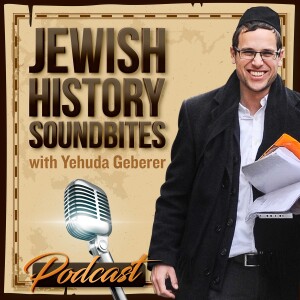
Thursday Aug 08, 2024
The Death Marches
Thursday Aug 08, 2024
Thursday Aug 08, 2024
Towards the end of 1944, as it became clear to the senior officers of the Nazi SS that the war was lost, they decided to evacuate the many concentration camps which held several hundred thousand inmates, and which stood in the path of the rapidly advancing Red Army. Himmler and his SS didn’t want to leave living witnesses to be liberated by the Allied armies, and they also wished to utilize the slave labor of concentration camp inmates in the remaining war industry in Germany for the duration of the war. During the winter of 1944-45, a mass evacuation of nearly a half a million prisoners commenced from large concentration camps such as Auschwitz-Birkenau, Stutthof and Gross-Rosen, along with many smaller camps, began under horrid conditions. Starved, diseased, freezing weather, lack of preparation for the journey, and constant shootings of those who lagged behind, made these death marches a murderous journey, in which tens of thousands were killed or died along the way. As trains were often unavailable, the bulk of these death marches took place on foot. This last deadly phase of the Holocaust was a tragic ending for many victims, and a traumatic memory for the few survivors.
Cross River, a leading financial institution committed to supporting its communities, is proud to sponsor Jewish History Soundbites. As a trusted partner for individuals and businesses, Cross River understands the importance of preserving and celebrating our heritage. By sponsoring this podcast, they demonstrate their unwavering dedication to enriching the lives of the communities in which they serve. Visit Cross River at https://www.crossriver.com/
Subscribe to Jewish History Soundbites Podcast on: PodBean: https://jsoundbites.podbean.com/ or your favorite podcast platform
Follow us on LinkedIn, Twitter or Instagram at @Jsoundbites
For sponsorship opportunities about your favorite topics of Jewish history or feedback contact Yehuda at: yehuda@yehudageberer.com
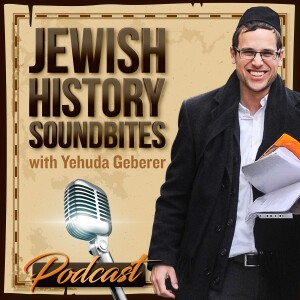
Monday Jul 29, 2024
The Tzadik of Shtefanesht
Monday Jul 29, 2024
Monday Jul 29, 2024
Rav Avraham Matisyahu Friedman of Shtefanesht (1849-1933) was a grandson of Rav Yisrael Friedman of Ruzhin, leader of the Shtefanesht Chassidic dynasty for 65 years, and one of the most important rabbinical figures in Romanian Jewry during his lifetime. Though mysterious in his silent ways, he held sway over thousands who sought his advice and blessing, influencing the wider community well beyond the confines of his Chassidic followers. Upon his passing away childless in 1933, the Shtefanesht dynasty came to an end. But following his reburial in Israel in 1969, a resurgence of interest into his life story and the miraculous power of his prayer and blessing attributed to him, leaves a lasting legacy which only continues to grow with time.
Cross River, a leading financial institution committed to supporting its communities, is proud to sponsor Jewish History Soundbites. As a trusted partner for individuals and businesses, Cross River understands the importance of preserving and celebrating our heritage. By sponsoring this podcast, they demonstrate their unwavering dedication to enriching the lives of the communities in which they serve. Visit Cross River at https://www.crossriver.com/
Subscribe to Jewish History Soundbites Podcast on: PodBean: https://jsoundbites.podbean.com/ or your favorite podcast platform
Follow us on LinkedIn, Twitter or Instagram at @Jsoundbites
For sponsorship opportunities about your favorite topics of Jewish history or feedback contact Yehuda at: yehuda@yehudageberer.com
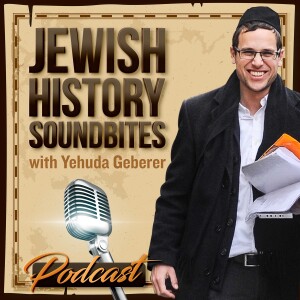
Tuesday Jul 16, 2024
Haskala in 19th Century Imperial Russia Part II
Tuesday Jul 16, 2024
Tuesday Jul 16, 2024
The Jewish enlightenment movement – known as the Haskala, endeavored to implement changes within the Jewish communal structure in the modern era. Though the haskala in its many manifestations existed in many countries in the modern era, this episode will focus on the haskala in 19th century Czarist Russia. Throughout the 19th century, the haskala grew into somewhat of a movement, and promulgated initiatives to integrate Russian Jewry into surrounding society, through changes in communal infrastructure, education, economy, rabbinate and culture. Often working with the governmental authorities, the haskala faced much opposition from the traditional establishment. The story of the haskala, its limited impact, the response of the traditional community and the legacy of the haskala, reverberates down to this very day.
Cross River, a leading financial institution committed to supporting its communities, is proud to sponsor Jewish History Soundbites. As a trusted partner for individuals and businesses, Cross River understands the importance of preserving and celebrating our heritage. By sponsoring this podcast, they demonstrate their unwavering dedication to enriching the lives of the communities in which they serve. Visit Cross River at https://www.crossriver.com/
Subscribe to Jewish History Soundbites Podcast on: PodBean: https://jsoundbites.podbean.com/ or your favorite podcast platform
Follow us on LinkedIn, Twitter or Instagram at @Jsoundbites
For sponsorship opportunities about your favorite topics of Jewish history or feedback contact Yehuda at: yehuda@yehudageberer.com
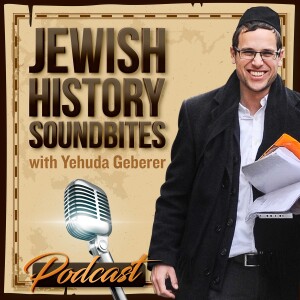
Sunday Jul 14, 2024
Haskala in 19th Century Imperial Russia Part I
Sunday Jul 14, 2024
Sunday Jul 14, 2024
The Jewish enlightenment movement – known as the Haskala, endeavored to implement changes within the Jewish communal structure in the modern era. Though the haskala in its many manifestations existed in many countries in the modern era, this episode will focus on the haskala in 19th century Czarist Russia. Throughout the 19th century, the haskala grew into somewhat of a movement, and promulgated initiatives to integrate Russian Jewry into surrounding society, through changes in communal infrastructure, education, economy, rabbinate and culture. Often working with the governmental authorities, the haskala faced much opposition from the traditional establishment. The story of the haskala, its limited impact, the response of the traditional community and the legacy of the haskala, reverberates down to this very day.
Cross River, a leading financial institution committed to supporting its communities, is proud to sponsor Jewish History Soundbites. As a trusted partner for individuals and businesses, Cross River understands the importance of preserving and celebrating our heritage. By sponsoring this podcast, they demonstrate their unwavering dedication to enriching the lives of the communities in which they serve. Visit Cross River at https://www.crossriver.com/
Subscribe to Jewish History Soundbites Podcast on: PodBean: https://jsoundbites.podbean.com/ or your favorite podcast platform
Follow us on LinkedIn, Twitter or Instagram at @Jsoundbites
For sponsorship opportunities about your favorite topics of Jewish history or feedback contact Yehuda at: yehuda@yehudageberer.com
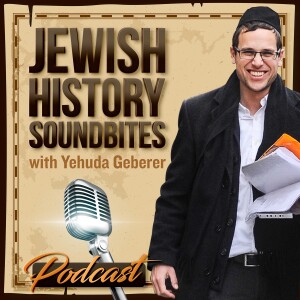
Wednesday Jul 03, 2024
Karaite Jews in Czarist Russia
Wednesday Jul 03, 2024
Wednesday Jul 03, 2024
Though never large in number, the Karaite communities of Russia are an interesting side chapter in Russian Jewish history. Residing primarily in the Crimean Peninsula, with communities in Ukraine, Poland and Lithuania, the Czarist government recognized the Karaites as distinct from Rabbinic Jews. Due to this recognition and intense lobbying efforts, the Karaite community was gradually absolved from the many restrictions pertinent to the Jews of the empire, including permission to reside outside the Pale of Settlement. Karaite scholars from Lutzk flourished in Crimea during the 19th century, and one of their endeavors was to write a new history of Karaites of the region. The most famous of these was Avraham Firkovich, whose research and collections played a large role in forming the new Karaite identity as ethnically distant from the Jewish People. Though much of his work was proven to be based on forgeries, the Karaite community of Russia was overall successful in remaining a distinct ethnic tribe from the Jewish People, and therefore not susceptible to Czarist discrimination.
Cross River, a leading financial institution committed to supporting its communities, is proud to sponsor Jewish History Soundbites. As a trusted partner for individuals and businesses, Cross River understands the importance of preserving and celebrating our heritage. By sponsoring this podcast, they demonstrate their unwavering dedication to enriching the lives of the communities in which they serve. Visit Cross River at https://www.crossriver.com/
Subscribe to Jewish History Soundbites Podcast on: PodBean: https://jsoundbites.podbean.com/ or your favorite podcast platform
Follow us on LinkedIn, Twitter or Instagram at @Jsoundbites
For sponsorship opportunities about your favorite topics of Jewish history or feedback contact Yehuda at: yehuda@yehudageberer.com
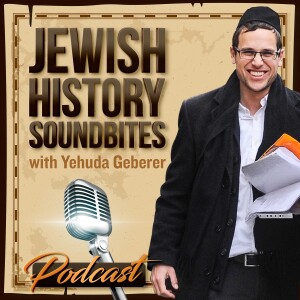
Saturday Jun 15, 2024
Tourbites: The Life & World of the Shach - Rav Shabsai Hakohen
Saturday Jun 15, 2024
Saturday Jun 15, 2024
Rav Shabsai Hakohen (1621-1663) was the author of one of the most important halachic works ever written, the Shach (Sifsei Kohen). His last rabbinical position and burial place in Holesov, Czechia, is a popular stop on Jewish history tours of Europe, along with the well preserved 16th century shul which served that community for centuries. On this episode of Jewish History Tourbites-Soundbites, we’ll explore the story of the Shach’s tumultuous life and great accomplishments, as well as the broader narrative of 17th century Polish Jewry which his life story reflects. Having been born into the rabbinic aristocracy during the golden age of Polish Jewry, he later fled his home and position in Vilna as a result of the upheavals during the Chmielnicki massacres of 1648-49 and the subsequent Second Northern War. His magnum opus was his commentary on Shulchan Aruch, the Shach, and he authored additional works on a variety of subjects including chronicles of Jewish history during his era.
Cross River, a leading financial institution committed to supporting its communities, is proud to sponsor Jewish History Soundbites. As a trusted partner for individuals and businesses, Cross River understands the importance of preserving and celebrating our heritage. By sponsoring this podcast, they demonstrate their unwavering dedication to enriching the lives of the communities in which they serve. Visit Cross River at https://www.crossriver.com/
Subscribe to Jewish History Soundbites Podcast on: PodBean: https://jsoundbites.podbean.com/ or your favorite podcast platform
Follow us on LinkedIn, Twitter or Instagram at @Jsoundbites
For sponsorship opportunities about your favorite topics of Jewish history or feedback contact Yehuda at: yehuda@yehudageberer.com
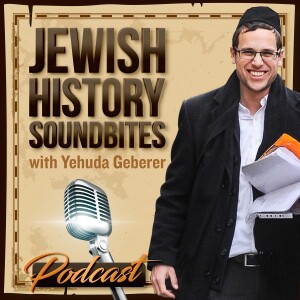
Thursday Jun 13, 2024
Tribute Episode: Rav Meir Wunder
Thursday Jun 13, 2024
Thursday Jun 13, 2024
The recent passing of Rav Meir Wunder (1934-2024) is an opportunity to pay tribute to this great man and his vast accomplishments as a historian, scholar and pioneer tour guide to Europe. Having attended Ponovezh Yeshiva in its early years, and gained a closeness with the Chazon Ish and many other Torah leaders of his time, he embarked on a career as a librarian. He eventually served as a librarian at the National Library of Israel for over 30 years. Emerging as a self-taught historian and respected scholar, he published his magnum opus six volume Encyclopedia of Chachmei Galicia, as well as numerous other volumes and essays on a wide array of topics of Jewish History. He was one of the early pioneers of Jewish history tours to Europe, leading hundreds of such tours for decades. May his memory be a blessing.
Cross River, a leading financial institution committed to supporting its communities, is proud to sponsor Jewish History Soundbites. As a trusted partner for individuals and businesses, Cross River understands the importance of preserving and celebrating our heritage. By sponsoring this podcast, they demonstrate their unwavering dedication to enriching the lives of the communities in which they serve. Visit Cross River at https://www.crossriver.com/
Subscribe to Jewish History Soundbites Podcast on: PodBean: https://jsoundbites.podbean.com/ or your favorite podcast platform
Follow us on LinkedIn, Twitter or Instagram at @Jsoundbites
For sponsorship opportunities about your favorite topics of Jewish history or feedback contact Yehuda at: yehuda@yehudageberer.com

Saturday May 18, 2024
Non-Ashkenazi Jews in Czarist Russia
Saturday May 18, 2024
Saturday May 18, 2024
Far from the Pale of Settlement, the Jews of Georgia, Bukhara, the Caucasus (Mountain) Jews, and other Jewish communities of Central Asia, found themselves under the jurisdiction of the Russian Empire over the course of the 19th century. These ancient Jewish communities had been under the influence of their Muslim surroundings for centuries, when through a series of conquests, they now found themselves confronting the Czarist regime. Unlike the majority of their brethren in Russia, they were not required to reside in the Pale, and as a result weren’t restricted by much of the legislative limitations applicable to the overwhelming majority of Russian Jewry. The story of Central Asian Jewry, is a lesser known narrative of Russian Jewry under the Czars.
Cross River, a leading financial institution committed to supporting its communities, is proud to sponsor Jewish History Soundbites. As a trusted partner for individuals and businesses, Cross River understands the importance of preserving and celebrating our heritage. By sponsoring this podcast, they demonstrate their unwavering dedication to enriching the lives of the communities in which they serve. Visit Cross River at https://www.crossriver.com/
Subscribe to Jewish History Soundbites Podcast on: PodBean: https://jsoundbites.podbean.com/ or your favorite podcast platform
Follow us on LinkedIn, Twitter or Instagram at @Jsoundbites
For sponsorship opportunities about your favorite topics of Jewish history or feedback contact Yehuda at: yehuda@yehudageberer.com
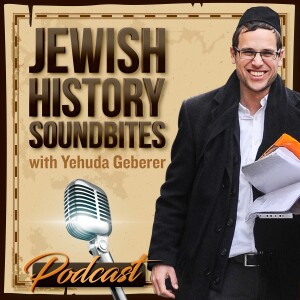
Sunday Apr 21, 2024
The Machine Matzah Controversy
Sunday Apr 21, 2024
Sunday Apr 21, 2024
The Industrial Revolution brought the mechanization of manual labor, and this reached the matzah baking industry in the mid-19th century. Although it was initially accepted in Western Europe, when it arrived in Galicia in 1857, it sparked a controversy between leading rabbinical authorities regarding the permissibility of its use. Tracing the development of the stages of this dispute leads one to the underlying reasoning of the opponents of the new machine. Beneath the veneer of a generic halachic difference of opinion, was the confrontation with modernity with modern technology as its expression.
This episode is based on the recently published excellent book regarding the history of the machine matzah controversy, which was published by Yisroel Tress
Cross River, a leading financial institution committed to supporting its communities, is proud to sponsor Jewish History Soundbites. As a trusted partner for individuals and businesses, Cross River understands the importance of preserving and celebrating our heritage. By sponsoring this podcast, they demonstrate their unwavering dedication to enriching the lives of the communities in which they serve. Visit Cross River at https://www.crossriver.com/
Subscribe to Jewish History Soundbites Podcast on: PodBean: https://jsoundbites.podbean.com/ or your favorite podcast platform
Follow us on LinkedIn, Twitter or Instagram at @Jsoundbites
For sponsorship opportunities about your favorite topics of Jewish history or feedback contact Yehuda at: yehuda@yehudageberer.com
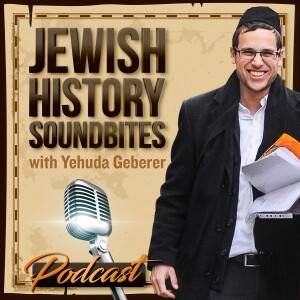
Sunday Apr 14, 2024
Beyond the Pale: Russian Jewry outside the Pale of Settlement
Sunday Apr 14, 2024
Sunday Apr 14, 2024
The Russian Czarist government restricted Russian Jewry to the western provinces of the empire through a series of legislative acts, which came to be known as the Pale of Settlement. Starting in the 1850’s, provisions were enacted which enabled certain types of Jews to reside outside the Pale. Wealthy merchants, those with academic degrees, certain kinds of military veterans and craftsman, were gradually permitted to reside anywhere they desired across the Russian Empire. This process is now referred to as selective integration, and it proceeded quite slowly, and was often accompanied by other restrictions. This integration process didn’t lead to the desired emancipation, and was further limited by a reactionary policy pursued by the Czar following the pogroms of 1881-82. The Jewish community of St Petersburg emerged as the self-appointed leadership of Russian Jewry, and interceded on behalf of the Jews within the Pale with limited success.
Cross River, a leading financial institution committed to supporting its communities, is proud to sponsor Jewish History Soundbites. As a trusted partner for individuals and businesses, Cross River understands the importance of preserving and celebrating our heritage. By sponsoring this podcast, they demonstrate their unwavering dedication to enriching the lives of the communities in which they serve. Visit Cross River at https://www.crossriver.com/
Subscribe to Jewish History Soundbites Podcast on: PodBean: https://jsoundbites.podbean.com/ or your favorite podcast platform
Follow us on LinkedIn, Twitter or Instagram at @Jsoundbites
For sponsorship opportunities about your favorite topics of Jewish history or feedback contact Yehuda at: yehuda@yehudageberer.com
